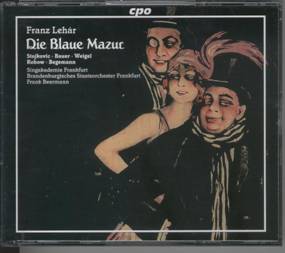CPO 777 331-2

Die Blaue Mazur
CPO 777 331-2

The operetta is not Lehar’s best known and for good reason. Contrary to custom as proven by Witwe, Zigeunerliebe, Graf von Luxemburg, Land des Lächelns, Paganini, Friederike, Zarewitch etc. etc. this time it takes two hearings and even a quick third one before one is humming along. This means that the most gifted melodist of the 20th century is here less than four times as inspired as all of his contemporaries (maybe Puccini, Kalman, Sorozabal, Torroba excepted) and successors together. This means too that even less than brilliant Lehar is a must for everybody who thinks in Mme Callas’s words “that music is meant to soothe the nerves and not to stimulate them.” Up to now collectors all over the world exchanged a fine Austrian radio performance of the fifties with tenor Rudolf Christ in the title role. And there was a selection available in Italian together with Lehar’s Der Sterngucker changed by Carlo Lombardi in La Danze delle Libellule (with well known tenor Giuseppe Campora). Now there is for the first time a brand new official recording produced two years ago. I admit I listened to it with some trepidation as nowadays most singers have not got operetta in their blood anymore; anyway in the way I like it: with voice, lots of voice but still with schwung and a feeling for the genre. Some of the recent products like Lehar’s Schön ist die Welt were sung, even roared as if Lehar’s operetta’s have lots of common ground with Verdi’s Otello. Zoran Todorovich especially succeeded in making several recordings simply unpalatable.
Therefore it’s quite a relief to notice that tenor Johan Weigel is a marked improvement: someone with experience as a good operatic lyric tenor but with operetta as well under his belt. The voice is strong, agreeable and yet supple enough to sing Lehar’s arias which will often expose cruelly the weaknesses in a singer’s armor. Weigel can sing a waltz as proven by his “Ich darf nur eine Liebe” without overkilling it. He has the vocal goods for the mazurka duet as well where one immediately notes that Johanna Stojkovich is not on the same level. She was a good Zorika on the same label’s Zigeunerliebe but as far as I know operetta is not her usual fare and there is a little bit clumsiness compared to really great operetta diva’s like Schwarzkopf, Popp, Rothenberger (who all sang very little operetta on the scene but had heard it hours at a stretch from the moment they were born). Mind you, she is not a liability but she is a bit less fluent than Weigel. Still there is a fine voice. The comprimario-roles are well sung too. Conductor Frank Beermann is the old-fashioned Kapellmeister who is used to conduct the whole repertory in a theatre. He has a weakness for belcanto (in fact he conducted Otto Nicolai’s Il Templario; once as popular as young Verdi’s operas), which means a sense for the essential legato so necessary in operetta. He is now somewhat one of the house conductor of the CPO label. He takes his operettas seriously which means that he has a feeling for the flow of the music and is not heavy handed. After all Die Blaue Mazur was Lehar’s last comic operetta before he started on the last step in his career where the tenor and soprano didn’t get each other at the end. Beermann has the Brandenburgische Staatsorchester at his disposal; one of the former ensembles of the defunct GDR where operetta remained far more popular as influences of the commercial Anglo-Saxon environmental pollution were not encouraged by the communist party. One hears the joy of playing such a melodious score. In short a must for every lover of opera and operetta.
Jan Neckers